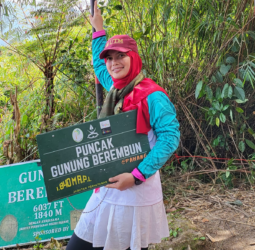DILEMA PENSYARAH BERSAMA BAKTI YANG DICURAHKAN 🙂

https://www.sinarharian.com.my/article/99042/KHAS/Pendapat/Bahagiakah-seorang-pensyarah
Sharing from Article SINAR HARIAN
**Profesor Madya Dr Salasiah Hanin Hamjah di Pusat Kajian Dakwah & Kepimpinan, Fakulti Pengajian Islam, Universiti Kebangsaan Malaysia
KERJAYA sebagai pensyarah adalah kerjaya yang mulia. Ramai pelajar yang telah dididik sehingga menjadi insan yang berguna kepada agama dan negara.
Pada waktu dahulu, pensyarah sering dipandang tinggi oleh masyarakat kerana keilmuan serta sahsiahnya yang mulia untuk dicontohi.
Mahasiswa pada ketika itu sangat menghormati pensyarah, menundukkan sedikit badan apabila lalu di hadapan mereka dan pasti akan memberi salam ketika bersua.
Jika sudah membuat temujanji untuk bertemu, pastinya akan datang lebih awal sebelum masa yang dijanjikan. Senario ini agak berbeza pada masa kini. Pelajar sekarang lebih mempunyai ruang untuk mendekati pensyarah.
Pensyarah ada masanya menjadi kawan dan ada masanya menjadi ibu atau bapa kepada pelajar. Jika pelajar melakukan kesalahan, mereka tidak lagi dilemparkan kertas sehingga bertaburan di atas lantai. Jika mereka datang kuliah lewat, pensyarah hanya boleh memberi peringatan dan tidak mengunci pintu dewan kuliah.
Nota kuliah pula boleh diperoleh secara online malah kuliah kadang-kadang berlaku secara maya. Benarlah, dunia telah berubah dan rentak manusia turut berubah. Pensyarah terus berusaha menyesuaikan diri dengan kerjaya mereka meskipun skop kerja semakin luas. Jika dahulu, pensyarah lebih menumpukan kepada pengajaran, penyeliaan, penulisan dan khidmat masyarakat, tetapi kini skop kerja pensyarah ditambah dengan penglibatan di dalam penyelidikan.
Jika dahulu pensyarah cenderung menulis buku tetapi sekarang pensyarah perlu menulis artikel jurnal SCOPUS/WoS/ERA/Mycite sebagai KPI tahunan. Dalam PdP pula, pensyarah perlu menguasai kemahiran teknologi digital untuk memenuhi tuntutan semasa dalam dunia pengajaran dan pembelajaran kontemporari. Pensyarah juga perlu menjalankan penyelidikan dengan industri dan komuniti di peringkat kebangsaan dan antarabangsa.
Pensyarah juga perlu memberi khidmat masyarakat berbentuk perundingan, rujukan pakar, ceramah, kuliah dan keterlibatan dalam badan profesional supaya visibiliti mereka tersohor di persada negara. Pendek kata pensyarah perlu menguasai pelbagai kemahiran multi tasking dan menjadi serba boleh. Ini menjadikan dunia pensyarah semakin sibuk kerana tuntutan kerjaya yang terlalu banyak. Hakikatnya tugas pensyarah lebih-lebih lagi di universiti penyelidikan semakin mencabar.
Kadang-kadang ada yang mengambil sikap buat tidak tahu sahaja apabila merasai keupayaan diri sudah tidak mampu mengikuti peredaran dan kehendak semasa yang terlalu tinggi. Ada juga yang berusaha menyahut cabaran dan berusaha memenuhi tuntutan semasa terutamanya menerbitkan artikel dalam jurnal antarabangsa yang berimpak tinggi.
Malangnya, ada yang kecewa apabila artikel yang dihantar ke jurnal berprestij, ditolak. Sekali dua mencuba, masih ada semangat. Bagaimanapun, setelah berusaha berkali-kali, akhirnya timbul juga perasaan jemu dan putus asa. Itulah antara cabaran yang perlu ditempuh oleh seorang pensyarah. Lebih menyedihkan, kadang-kadang kesibukan memaksa segelintir pensyarah tidak cukup persediaan ilmu untuk mengajar kerana masa banyak dihabiskan pada tugasan lain yang mencabar.
Saya yakin, apa pun cabaran yang ditempuh, pensyarah tidak pernah menyesal menjadi seorang pensyarah, cuma memohon ada timbangtara yang diplomasi pada kerjaya ini pada masa mendatang.
Semoga usaha MAAC (Kongres Persatuan Akademik Malaysia) berkaitan isu kenaikan pangkat pensyarah di institusi pengajian tinggi awam mendapat jalan keluar terbaik.
Semoga kerjaya pensyarah ini kekal menjadi kerjaya yang mulia, yang dapat membimbing manusia ke arah menjadi insan berjasa. Diharapkan juga agar pensyarah mempunyai masa yang munasabah untuk menajamkan ilmu dan kepakaran dengan mengurangkan kesibukan mereka pada perkara-perkara teknikal yang sering berubah-ubah. Kadang-kadang terbanding juga dengan kerjaya pendidik lain seperti di sekolah.
Guru-guru ada time base dalam kenaikan pangkat, malah gaji mereka lebih kurang sahaja dengan gaji pensyarah padahal pensyarah perlu belajar sehingga ke peringkat doktor falsafah. Ada juga yang bekerja di bahagian pentadbiran, gaji mereka lebih banyak walaupun pensyarah mempunyai kelulusan yang lebih tinggi. Kita bimbang jika keadaan ini berterusan, suatu hari nanti, anak-anak muda kurang berminat memilih kerjaya ini yang disimpulkan terlalu sibuk dengan ganjaran yang kurang sepadan.
Kita juga bimbang, jika pensyarah terlalu disibukkan dengan urusan lain, cendikiawan mereka semakin terhakis kerana keterbatasan masa untuk terus menggali intipati ilmu.
Harapan saya, walau apa jua cabaran yang ditempuh oleh pensyarah, semoga mereka terus cekal menempuhnya dan Allah permudahkan segala urusan mereka dan Allah angkat darjat mereka sebagai pendidik yang mulia, yang setia menabur bakti untuk kesejahteraan anak bangsa.
Semoga segala ilmu yang dicurahkan kepada pelajar akan menjadi amal jariah untuk manfaat pensyarah di alam abadi. Biarlah kekayaan bukan menjadi impian di dunia tetapi biarlah ilmu yang disampaikan menjadi pedoman kepada generasi harapan sepanjang hayat mereka.Aamiin.














